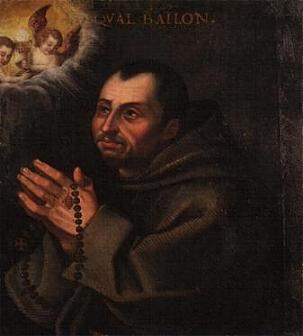The life of Paschal Baylon (1540 – 1592) has much in common with that of his fellow Franciscan, Joseph of Cupertino (+1633). They were both Franciscan friars who adopted lives of great humility and austerity – Paschal would wear a spiked metal coat, or a habit with rough pig hair on the inside. They were both committed to prayer and charity to others, eating little, often scraps and boiled vegetables, and had a great devotion to the Blessed Sacrament, often spending whole nights in adoration. Like a hobbit, Paschal went perpetually barefoot, even in the snow, but without their naturally tough feet. He had to acquire such; but we tenderfoots never become hobbits, and one wonders how much that cost him.
Paschal was born to poor parents on the feast of Pentecost, hence his name. They could not afford an education but, during his time working as a shepherd (what is it with shepherd’s becoming saints? I may need a career change…) With the Little Office of the Blessed Virgin his mother had given him, Paschal taught himself to read by asking others what the words meant. He joined the Reformed Franciscans in 1564, discerning clearly that he was not called to the priesthood, remaining a brother, fulfilling his humble, and often humiliating, tasks (he was their official cook, beggar and almoner) to the utmost.
As with most true ascetics, he accepted suffering joyfully, for the love of God and the sake of souls, Paschal was always cheerful, supernaturally so, never perturbed, and solicitous for those around him. Yet he stood for the truth, and was once nearly killed by a Calvinist mob when he defended the Eucharist against the sacrilegious words of one of their preachers.
Paschal died of an unknown illness the day after his 52nd birthday, on May 17th, 1592, as the Protestant Reformation and revolt against the Church was reaching its height. Immediately hailed a saint, he was canonized by Pope Alexander VIII on October 16th, 1690. His relics were burned by Spanish communists during the Red Terror in 1936, and what remained after that was given to King Juan Carlos in May of 1992.
May Saint Paschal intercede for unity and charity in all that divides us, that we all submit humbly to the truth, as it is revealed to us.
Although we may not be called to Paschal’s ascetical extremes, we can at least accept the daily thorns and thistles, discomforts and unwanted tasks of this vale of tears, with some small share of his peace of soul and interior joy, which, as Christ promises in today’s Gospel, the world cannot take away.
Saint Paschal Baylon, ora pro nobis! +


